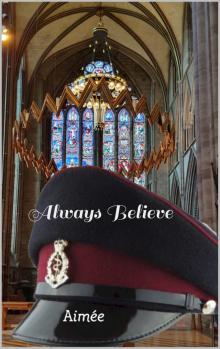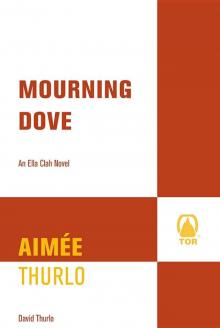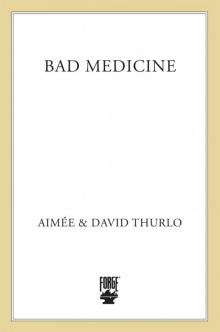Always Believe Read online
Always Believe
Aimée
By the same author:
As War Goes By
Face the Music
Copyright © 2019Aimée
All rights reserved.
ISBN : 9781701758353
Disclaimer
This is a work of fiction. Names, characters, business, events and incidents are the products of the author’s imagination. Any resemblance to actual persons, living or dead, or actual events is purely coincidental. The facts concerning the Church of England, however, are real, except for what happens in the Epilogue – that part is pure wishful thinking on my part, and may happen soon – who knows?
Many, many thanks to Jacky for a stellar editing job
.
Prologue
All the world’s a stage,
And all the men and women merely players;
They have their exits and their entrances;
And one man in his time plays many parts…
William Shakespeare
England, 2017
The familiar music came into the auditorium and Angela prepared herself for a boring night. She had heard The Nutcracker every weekend her daughter had come home for nearly six months. Not the whole ballet – just the Spanish dance and the Snowflake waltz – which was even more maddening. She was the one to blame, though. She had brought her daughter to see the seasonal ballet at Covent Garden when the little girl was only four, and after the performance, Sybil had begged her for ballet lessons. Angela had never intended to ignite in the tiny mite a life-long passion for dance, but… Best laid plans and all…The weekly class had soon grown to twice weekly, and a year ago, Sybil had asked to go to a residential ballet school. She would never have sent her daughter away at ten years old, but the little girl had begged and begged and her ballet teacher had joined her pleas to hers. She hadn’t wanted to lose her star pupil, but she knew that Sybil had the qualities to become a professional – a slim figure, a perfect instep, and a natural ear, as well as enviable flexibility and most of all, absolute dedication. Faced with two very stubborn ballet-mad people, one of them her own daughter - to whom she’d never been able to refuse anything - Angela had yielded and enrolled Sybil at Middlefield Dance Academy, more than a hundred miles from home. And today, her daughter had one of the main parts in the Academy’s annual gala – two main parts, actually – one of the Spanish puppets and a Snowflake. Angela endured the beginning of the ballet and sat up in her seat when she saw her daughter appear on stage. The red-and-black Spanish costume suited her and with her dark hair, she absolutely looked the part. Moreover, judging by the wide grin on her face – the year before, Angela had forgotten her opera glasses, but this year she’d come prepared – her daughter was having the time of her life.
When she collected her still slightly sweaty and heavily made-up daughter after the show, the teenager was still on a high from the excitement and Angela was treated to a full review of the performance during their drive back home.
Afghanistan, 2017
Another day of dust, heat and blood. Not that Greyson was ever bored, but her working conditions never got any easier. And yet she wouldn’t want to be anywhere else. As long as she felt she was making a difference, as long as she was needed, she was happy. Each time she and her team treated a patient successfully, the subsequent boost of self-esteem and endorphins gave her more than enough reason to stay. Not that she really had a choice – when you were in the Forces, you went where you were sent. But she had no regrets – the army had given her more independence than she had ever had. The challenges she faced every day under the medical tent of the patrol base in the Nad ‘Ali area of Helmand province kept her busy and more than made up for the inevitable constraints of army life. Routine treatments for minor ailments and preventive actions for conditions such as frostbite and heatstroke were always interspersed with more major injuries, and Greyson had to admit that those made her heart beat a little faster. Even though the more serious cases were med-evacuated to Camp Bastion, she was responsible for stabilising them and saving their lives in the first place. Besides, they also treated civilian casualties – the innocent victims of the conflict raging around them. Stray bullets didn’t care whether the target was a soldier or a child. Doctors didn’t either, normally, but they gritted their teeth when the casualty obviously belonged to the bad guys.
Chapter 1
Gloucester, 2019.
Jesus said to her: “I am the resurrection and the life. Whoever believes in me, though he dies, yet shall he live, and everyone who lives and believes in me shall never die. Do you believe this?” John 11: 25-26
« We meet in the name of Jesus Christ, who died and was raised to the glory of God the Father. Grace and mercy be with you. We have come here today to remember before God our sister Sybil, to give thanks for her life; to commend her to God our merciful redeemer and judge; and to comfort one another in our grief.
As she listened to the now familiar service, Greyson Walsden took a moment to remember all the men and women who’d been laid to rest with those same words. Too many – always too many. Why did she always remember the ones she had not been able to save, instead of the ones who had survived? Of course, she wanted to believe they had not died in vain. It was one of the reasons she had joined the Royal Army Medical Corps – because somehow, saving soldiers’ lives was even more important than saving civilians – or so she had thought when she was younger. The other reason, of course, had been to piss off her parents…
“Father, you know our hearts and share our sorrows. We are hurt by our parting from Sybil whom we loved: when we are angry at the loss we have sustained, when we long for words of comfort, yet find them hard to hear, turn our grief to more patient faith, our affliction to firmer hope in Jesus Christ our Lord. Amen.”
She bowed her head with the rest of the congregation during the prayer. It was always harder for the living – the ones that remained behind. Especially after the death of a child. That took unbelievable strength and courage to overcome. Greyson scanned the group assembled in the chapel. The parents - but who was who? Two women in black and a man, apparently supporting both of them. A young willowy blonde and a more mature redhead. Maybe the younger one was the deceased’s sister? She looked young enough – so the others must be the parents. A little boy, looking bewildered, nestled between them. An elderly man, supported by another blonde woman, also sat in the family plot, with two middle-aged men who looked like carbon copies of each other. Only the two blonde women were crying, and somehow Greyson thought they were probably not the closest to the deceased.
“Our days are like the grass; we flourish like a flower of the field; when the wind goes over it, it is gone and its place will know it no more.
But the merciful goodness of the Lord endures for ever and ever toward those that fear him and his righteousness upon their children’s children.”
She glanced at the open coffin – the child could have been asleep – her face was intact, and she looked at peace. But so young …
At the end of the service, she stood unobtrusively at the back while Reverend Jones comforted the family. She could hear a few words: “Angela– I’m so sorry for your loss”. She heard the redhead’s reply too: “James wanted this funeral – I didn’t – you know I don’t believe in God anymore.” Greyson’s heart constricted – if you couldn’t find solace in Him, how could you move on?
When it was her turn to offer her condolences, she soberly shook the hands of the family, murmuring: “She is at peace now – in a better place, with God.” The mother did not even look up, but by the stiffening of her posture and her limp handshake, Greyson knew she had said the wrong thing. She waited discreetly until Emily Jones had finished with the service and the mourners before
approaching her: “Thank you for letting me join. You did a great job – I wonder how you can let it go - you will miss this.” Then, realising what she’d said, she put her hand in front of her mouth: “I’m sorry – that’s not… Of course that’s not what I mean – you know what I mean, right?” Who in their right mind would miss funerals?
The Reverend looked at her kindly: “Yes, my dear – I know what you mean. And yes, I will miss it.”
“You… You always seem to know what to say – to find the right words – you’re so lucky!”
“It isn’t a question of luck, Greyson – it’s a question of thought – practice – experience.”
Greyson hung her head and bit her lips: “Yes … Of course, sorry.” Why did she always say the wrong thing? She’d got a bit better at it as she got older, but it was still hard for her. She would have to conquer that, otherwise she would be an abject failure. At this time of her life, she couldn’t afford any more failures, any more mistakes. She had already made too many. Sometimes she thought her whole life had been a mistake – her parents’ mistake. The Drs Walsden had never seemed particularly pleased to have a daughter. She had long thought that had she been a boy, she would have been better received – her name was pretty self-explanatory. Maybe it explained why she had chosen not to have children. That, and the fact that she hadn’t exactly had the opportunity. They had always seemed more preoccupied – and more fulfilled – by their careers than by her. Her father had been a successful cardiologist, with a thriving practice. Greyson’s parents had met in medical school. Her mother had been three years younger than her father, already in specialist training. When Greyson had asked questions, her mother had always told her her birth had been a “happy accident”, but it had meant Geraldine Walsden had had to kiss goodbye to a specialisation and to remain a GP. From a very young age, she had known what she had to do to please them – get good grades, become a doctor – a specialist preferably, and get married. And at first, she had obeyed. She had tried her best. Always. She had never wanted to disappoint them. Never listened to her own heart. Until…
Once back home, she put a pizza in the microwave – once again she realised she hadn’t had anything to eat all day long – and while it was cooking she went into her bedroom, opened the wardrobe and stared. Sunday was the day – she felt like a little girl staring at her first grown-up dress. Not that it had ever been her thing, but her mother had liked to dress her up in pretty pastels and flowery dresses. She had been too old for the last Liberty dress, almost eleven – she would never forget it, though. Her mother had insisted she wear it for a family reunion – all her cousins wore jeans or leggings with shirts or sweatshirts, and they had teased her mercilessly about her dress. Lacey, her sixteen-year-old cousin, had taken pity on her…She had dropped the ashes of her cigarette on the dress accidentally on purpose, burning a hand-sized hole in the fabric. It had earned Greyson a resounding slap and a scolding from her mother, but she had never had to wear a Liberty dress again. Her new clothes couldn’t be more different from a flowery frock, and yet she knew she would feel as alien in them as she had in that dress forty years before. Only now, she had chosen this path, this function, for herself. Hopefully the clothes would help her to fit in, maybe for the first time in ages. She hadn’t been an obvious fit for the army either, although she had managed to be very convincing before the recruitment board. She had never liked obeying orders, and yet all her working life had required discipline and obedience – maybe now even more than in the Forces.
“Come home with us – you can’t be alone at this time – please, Angela.”
“Thank you, James – I’d rather be on my own.”
Angela hugged her ex-husband, his wife and his little boy and promised she would get in touch soon. Although they had split up amicably and she even liked his new family, she just wanted to be alone. Seeing Pierre, their little boy, just twisted the knife in her gut even more painfully. She didn’t want to dwell on the fact that he was alive when her own daughter was dead, but being with him would make matters worse. She had steeled herself for the funeral, but now it was over, she just wanted to bury herself in bed and to cry in peace. She drove herself back to the flat she had shared with her daughter, but every inch of it reminded her of Sybil. Even though her passion for ballet had made her beg to go away to school, the teenager was everywhere. Armed with a full bottle of whisky, Angela sank on the couch and proceeded to drink herself into oblivion.
Chapter 2
For I know the plans I have for you,” declares the Lord, “plans to prosper you and not to harm you, plans to give you hope and a future. Jeremiah 29:11.
Funerals were hard, but weddings evoked too many memories – most of them unwelcome. That was another thing she had not thought about. Looking at the young couple smiling lovingly at each other, she could just see herself thirty years before, swearing to “have and to hold from this day forward, for better, for worse, for richer, for poorer, in sickness and in health, to love and to cherish, till death do us part, according to God’s holy law.” Till death do us part had lasted exactly one year. A whirlwind engagement to George, a handsome medical student a little older than herself – the ideal son-in-law – during her second year at university. He had done everything right – courted her with roses, candlelight dinners and boxes of chocolate. He had behaved like the perfect gentleman, too – insisted that nothing would happen before their wedding night. A few kisses of course - that she had endured rather than appreciated, telling herself that they would get better and that one had got to get used to a probing tongue in one’s mouth. Then, after only a few months, he had invited her to an Italian restaurant, got down on his knees and produced a ring. They had got married in her parish church only six months after their first date. A fairy tale romance, a fairy tale wedding – she in a meringue dress and George in a morning suit.
Her parents were happy – his parents were happy – she had thought she was, too.
She must have been completely mad… She had been waiting for the wedding night eagerly – the kisses surely weren’t the best part – there had to be more – every romance novel promised more, after all. Only that first night, George had drunk too much, and nothing had happened. Then they had left for three days’ honeymoon in Cromer – not the most romantic place, but affordable on a med student’s budget- and nothing had happened there either. George had blamed the mussels and a weak stomach. She had nursed him through gastric flu and has reassured him it didn’t matter – she could wait a little longer. Once back in the small bedsit they had rented to get out of shared students’ digs, however, their first attempts had been disappointing, and she was still a virgin a month after the wedding. She had had no close male friends – nor female friends either – to talk to, and she had persuaded herself that her new husband’s lack of desire must be due to her being not good enough. Not pretty enough, not alluring enough. So she had tried her best to change – she abandoned her uniform of corduroy trousers and roll-neck jumpers for mini-dresses and heavy eye make-up. The change made some of her professors frown, and got her a few derogatory remarks, but did not ignite her husband’s passion.
She looked at her watch – if she didn’t go, she would be late. She caught Reverend Jones’s eye and the Reverend nodded. They would catch up later. For now, she had to live two lives – and she still wasn’t ready to sacrifice one for another, although it would have to come soon. She had already had to bid farewell to her army career, and that had been painful enough. The only good thing about her present situation was that it didn’t leave her with too much time to dwell on her present love life – or lack of.
The homeless shelter where she was working at present was a far cry from the top-of-the range military facilities she had been used to in recent years – in terms of comfort and supplies, it could even be considered worse than some of local medical practices she had seen in deployment. The ailments, however, mirrored those of the underprivileged civilians she had treated when in
Africa or in Afghanistan. The shelter, on the outskirts of Gloucester, had a few beds mostly for women and young people, but it mostly functioned as a drop-in centre where the homeless had access to food and showers. She worked there four half-days per week and a dentist, a psychologist and a social worker also offered their services on a part-time basis. It still appalled her to see what life in the streets could do to human beings – people who should have access to health care on a regular basis and yet came with cases of tuberculosis or advanced hepatitis. Many of them suffered from mental troubles as well as physical ailments, and these were even harder to treat. As a GP, she could prescribe drugs, but she had no way of making sure the patients would take them, and some drifted in and out of psychiatric hospitals. She could suture street fights wounds, she could give antibiotics when necessary, she could treat scabies and bronchitis, but what she couldn’t do was get rid of the burden of loneliness that clung to her patients like a second skin. It clung to her, too, when she went home. A singular stench of aloneness, of mistrust, and of despair. Every time she finished at the shelter and went home, it took her several hours to shake it off. It was even worse when she saw army vets at the shelter, because knowing what they had been through, she really felt their troubles in her own skin. She knew the horrors they had seen in the field, but she also understood their pain at being cast off from the sometimes only family they knew, the army, and how that pain could lead them to alcohol or drugs. She could so easily have been tempted herself… Somehow the fact that it was all her own fault, that she could have stayed as Regimental Medical Officer for several more years, made things even worse.

 Always Believe
Always Believe Shooting Chant
Shooting Chant Mourning Dove
Mourning Dove Ghost Medicine
Ghost Medicine Red Mesa
Red Mesa Death Walker
Death Walker Enemy Way
Enemy Way Bad Medicine
Bad Medicine